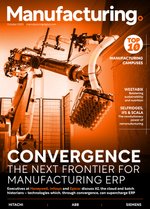Convergence: The Next Frontier For Manufacturing ERP

Today’s manufacturers are operating in the digital age, but many of the hurdles they face are decades old. One of the biggest is something almost everyone can relate to: organisation.
Manufacturing operations, from the biggest industry leaders to SMEs, require a lot of complex coordination. Products must be designed, developed, tested, produced, packaged and shipped in a continuous, reliable cycle.
Maintaining production is critical, so manufacturers must be ready to respond to the unpredictability of global supply chains and their subsequent impact on demand and product supply. To remain competitive, most embrace digital transformation, juggling implementation, training and experimentation with the need to avoid costly downtime.
With all these moving parts, missing the organisational mark can be devastating. Increased costs, obsolete inventory, production delays and reduced customer satisfaction are just a few of the consequences manufacturers can face. Average carrying costs alone run between 15% to 20% of inventory value but can reach 75% in some industries.
Addressing these challenges requires the extensive resource, data and inventory insight provided by enterprise resource planning (ERP).
Platforms in this area have proved to be a game-changer for manufacturers. ERP enables centralised management of every aspect of process and operations, from the production line to payroll. A study by Datix found that ERP solutions can reduce overall operational costs by 23% and administrative costs by 22%, transforming maintenance optimisation, quality assurance and cloud connectivity.
“ERP sits at the heart of an organisation, coordinating and managing core business processes across various departments,” says Arturo Buzzalino, VP of Products and Innovation at Epicor.
This statement encapsulates ERP’s place at the epicentre of manufacturing operations. Through its constant ebb and flow, it has the capacity to effect profound holistic change – both positive and negative.
But what often isn’t discussed is the realm of possibility when one goes beyond.
Technological convergence is the next big step for Industry 4.0 and ERP is a digital solution that holistically elevates the effectiveness of all others within an organisation.
Going beyond means getting better, improving not only ERP but every technology it intersects with, like cloud and AI.
Cloud, AI & ERP: Born to be together
Deloitte predicts the global sovereign cloud market will reach US$41bn by 2024, a 16% jump on 2023. SAP and NVIDIA have partnered to harness the power of generative AI (Gen AI) across SAP’s cloud and ERP solutions, while Microsoft has invested US$13bn into its partnership with OpenAI.
Cloud and AI are a critical part of manufacturing’s future and their convergence with other technologies like ERP is set to create profound new possibilities.
“Cloud and AI are the ubiquitous twins of modern innovation, transforming all industries – and manufacturing is no exception,” says Jasmeet Singh, EVP and Global Head of Manufacturing at Infosys
“But for manufacturing enterprises, the applications of cloud and AI go way beyond the finished product.
“These technologies are quickly getting embedded across the spectrum of manufacturing processes, making everything from production planning to quality control smoother and more efficient.”
ERP used to be about reflecting on the past, but today it’s shaping and analysing the present and future. For this reason, the next wave of intelligent ERP systems will arrive with integrated AI and cloud. Why? Because both of these tools are geared towards collecting and analysing colossal amounts of data, predicting potential issues, enhancing decision-making and optimising processes.
One organisation to go all-in on ERP and AI is Epicor. The global business software provider is a recognised leader in ERP, providing a platform intimately tailored to the manufacturing industry. The Epicor Grow Portfolio combines ERP with diverse AI functionality, including detailed inventory forecasting and predictive analytics.
“The Epicor Grow portfolio successfully harnesses this potential of AI-powered ERP,” says Arturo.
“The portfolio deploys a variety of AI technologies—including Gen AI, machine learning and predictive analytics—to support more than 200 specialised industry use cases. These solutions are designed to integrate seamlessly into specific environments and workflows, providing the insights and efficiencies needed for manufacturers to enhance operations.”
The Epicor Grow Portfolio’s subsequent data insights allow manufacturers to heighten efficiency and massively save on cost
“By integrating ERP systems with AI, industries are going beyond automating tasks, enabling systems to think, learn and make decisions in ways that haven’t been completely possible until now,” adds Arturo.
The Core Types of AI in the Epicor Grow Portfolio
Generative
Machine learning
Forecasting
Natural language processing
Predictive analytics
The possibilities of cloud and AI-enhanced ERP are far-reaching, from streamlining production processes to forecasting energy consumption.
Cloud ERP and AI can fast-track sustainability goals by providing a practical “green ledger” for tracking emissions, optimising the supply chain and ensuring ESG regulatory compliance.
Jasmeet emphasises that the relationship between AI and cloud is complementary and, arguably, integral to unlocking data’s true power.
“The cloud provides the limitless data storage and processing muscle that fuels AI,
while AI unlocks the hidden insights within that data to optimise production, predict failures and revolutionise efficiency,” he says.
“Unlocking the true value of that data requires the intelligent dance between the limitless scalability of the cloud and the transformative power of AI.
“Without the cloud, AI is a stalled engine; without AI, the cloud is a vast, untapped reservoir. It’s their combined force that propels us towards the future of intelligent manufacturing.”
Integral to the future of intelligent manufacturing is the technological convergence between ERP, AI and the Cloud. Paramount to making this convergence successful, is the integration of other innovative tools like batch historians.
Boosting Process: Batch historians & ERP
ERP systems and batch historians have a lot in common. They both play a vital organisational role and replace outdated manual processes – Excel for the former and ‘batch sheets’ for the latter.
Batch records or sheets do not provide sufficient contextualisation or visualisation of process data, making the overall data captured difficult to analyse. Manufacturers also struggle to utilise the data captured in other applications and expand it to a larger user base.
Honeywell’s Batch Historian doesn’t just replace this system, but rather elevates it through a meticulously-designed system of low-code reporting and intuitive design.
“Honeywell’s Batch Historian is a software digitalisation platform designed to help manufacturers gain insights from historic data,” says Shawn Opatka, Vice President and GM of Life Sciences at Honeywell Process Solutions.
“The new solution directly captures data with context from a range of batch engines without the need for complex rules configuration and leverages simple drag-and-drop tile configuration, eliminating the need for advanced programming skillsets or detailed historian database knowledge to develop reports.”
Historian systems are invaluable in manufacturing verticals with strict batch reporting and traceability requirements, like the food & beverage, life sciences, speciality chemicals and pharmaceutical industries.
Honeywell’s Batch Historian – through high levels of data integrity and stringent batch progress monitoring – gives manufacturers a richer, more holistic view of their operational data. This enhances safety and efficiency while streamlining product replication, facilitating flexible deployment, smoother compliance and quicker batch release.
“Recording batch data with context and simplifying the process of reporting that data will greatly enhance overall operational efficiency and help these industries as they embrace higher levels of digitalisation,” continues Shawn.
The Batch Historian can be used as an independent, standalone application, but is at its best when integrated as a module of Honeywell’s Manufacturing Excellence Platform (MXP), enabling it to converge with ERP.
“MXP capabilities include production visualisation, a batch historian, digital procedures, electronic logbooks, EBR/MBR and weigh and dispense, as well as integration capabilities for other ERP/IT/OT systems such as ERP,” Shawn adds.
“The unified data platform adapts to the IT/OT environment with a low-code solution that is easy to deploy, eliminating delays and accelerating ROI.”
The convergence of ERPs and batch historians will provide manufacturers with a multi-layered means of organising and streamlining operations that address both product production and the wider organisation. Organisational delays and disruptions impact product quality, and poor product quality causes disruptions and delays.
ERP, batch historians, cloud and AI are all inextricably linked, part of the same technological ecosystem that is driving profound change in the manufacturing sector.
Their convergence is set to usher in a new age of organisational prowess, giving manufacturers the oversight and information they need to reach their goals like never before.
To read the full story in the magazine click HERE
**************
Make sure you check out the latest edition of Manufacturing Digital and also sign up to our global conference series - Procurement & Supply Chain 2024 & Sustainability LIVE 2024
******
Manufacturing Digital is a BizClik brand.


